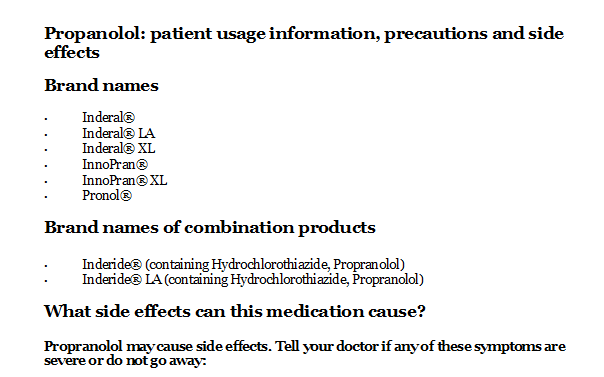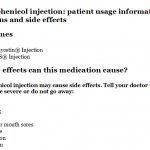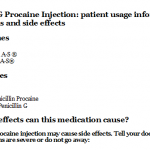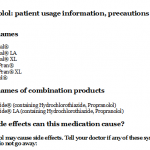
Propanolol: patient usage information, precautions and side effects
Tuesday, May 30, 2017 by Gregory Van Dyke
http://www.naturalnewsreference.com/2017-05-30-propanolol-patient-usage-information-precautions-and-side-effects.html

Propanolol: patient usage information, precautions and side effects
Brand names
-
Inderal®
-
Inderal® LA
-
Inderal® XL
-
InnoPran®
-
InnoPran® XL
-
Pronol®
Brand names of combination products
-
Inderide® (containing Hydrochlorothiazide, Propranolol)
-
Inderide® LA (containing Hydrochlorothiazide, Propranolol)
What side effects can this medication cause?
Propranolol may cause side effects. Tell your doctor if any of these symptoms are severe or do not go away:
-
dizziness or lightheadedness
-
tiredness
-
diarrhea
-
constipation
Some side effects can be serious. If you experience any of the following symptoms, call your doctor immediately or get emergency medical treatment:
-
difficulty breathing or swallowing
-
rash
-
blistering or peeling skin
-
hives
-
itching
-
swelling of the face, throat, tongue, or lips
-
feeling faint
-
weight gain
-
irregular heartbeat
Propranolol may cause other side effects. Call your doctor if you have any unusual problems while you are using this medication.
If you experience a serious side effect, you or your doctor may send a report to the Food and Drug Administration’s (FDA) MedWatch Adverse Event Reporting program online (http://www.fda.gov/Safety/MedWatch) or by phone (1-800-332-1088).
IMPORTANT WARNING:
Do not stop taking propranolol without talking to your doctor first. If propranolol is stopped suddenly, it may cause chest pain or heart attack in some people.
Why is this medication prescribed?
Propranolol is used to treat high blood pressure, irregular heart rhythms, pheochromocytoma (tumor on a small gland near the kidneys), certain types of tremor, and hypertrophic subaortic stenosis (a heart muscle disease). It is also used to prevent angina (chest pain), migraine headaches, and to improve survival after a heart attack. Propranolol is in a class of medications called beta blockers. It works by relaxing blood vessels and slowing heart rate to improve blood flow and decrease blood pressure.
High blood pressure is a common condition and when not treated, can cause damage to the brain, heart, blood vessels, kidneys and other parts of the body. Damage to these organs may cause heart disease, a heart attack, heart failure, stroke, kidney failure, loss of vision, and other problems. In addition to taking medication, making lifestyle changes will also help to control your blood pressure. These changes include eating a diet that is low in fat and salt, maintaining a healthy weight, exercising at least 30 minutes most days, not smoking, and using alcohol in moderation.
How should this medicine be used?
Propranolol comes as a tablet, solution (liquid),and as an extended-release (long-acting) capsule to take by mouth. The extended-release propranolol capsule (brand name: Inderal LA) usually is taken once a day. The extended-release capsule (Innopran XL, Inderal XL) is usually taken at bedtime and should consistently be taken either always with or always without food each time. Immediate-acting propranolol tablets or solution may be taken two, three, or four times a day. Take propranolol at around the same time(s) every day. Follow the directions on your prescription label carefully, and ask your doctor or pharmacist to explain any part you do not understand. Take propranolol exactly as directed. Do not take more or less of it or take it more often than prescribed by your doctor.
Swallow the extended-release capsules whole; do not split, chew, or crush them.
Other uses for this medicine
This medication may be prescribed for other uses; ask your doctor or pharmacist for more information.
What special precautions should I follow?
Before taking propranolol,
-
tell your doctor and pharmacist if you are allergic to propranolol, any other medications, or any ingredients in propranolol products. Ask your pharmacist or check the Medication Guide for a list of the ingredients.
-
tell your doctor and pharmacist what prescription and nonprescription medications, vitamins, nutritional supplements, and herbal products you are taking or plan to take. Be sure to mention any of the following: ACE inhibitors; antacids containing aluminum (Maalox, Mylanta, others); anticoagulants (”blood thinners”) such as warfarin (Coumadin, Jantoven); calcium channel blockers such as diltiazem (Cardizem, Cartia, Tiazac, others), nicardipine (Cardene), nifedipine (Adalat, Procardia XL), and nisoldipine (Sular); cholestyramine (Prevalite); cimetidine; ciprofloxacin (Cipro); chlorpromazine; colestipol (Colestid); diazepam (Diastat, Valium); digoxin (Lanoxin); fluvoxamine (Luvox); haloperidol (Haldol); HMG-CoA reductase inhibitors (cholesterol-lowering agents) such as lovastatin (Altoprev, Mevacor, in Advicor) and pravastatin (Pravachol); isoniazid (in Rifamate, in Rifater); medications for depression such as bupropion (Aplenzin, Forfivo XL, Wellbutrin, Zyban), fluoxetine (Prozac, Sarafem, Selfemra), imipramine (Tofranil), and paroxetine (Brisdelle, Paxil, Pexeva); fluconazole (Diflucan); medications for migraine headaches such as rizatriptan (Maxalt) and zolmitriptan (Zomig); medications for high blood pressure such as clonidine (Catapres, Kapvay, in Clorpres), doxazosin (Cardura), prazosin (Minipress), and terazosin; medications for seizures such as phenytoin (Dilantin, Phenytek) and phenobarbital; certain medications for irregular heartbeats such as amiodarone (Cordarone, Nexterone, Pacerone), propafenone (Rythmol), and quinidine (in Nuedexta); monoamine oxidase (MAO) inhibitors such as phenelzine (Nardil); montelukast (Singulair); nonsteroidal anti-inflammatory drugs (NSAIDs) such as indomethacin (Indocin, Tivorbex); theophylline (Theo-24, Theochron, Uniphyl); reserpine; rifampin (Rifadin, Rimactane, in Rifater, in Rifamate); ritonavir (Norvir, in Kaletra, in Viekira Pak); teniposide (Vumon); thioridazine; ticlopidine; tolbutamide; tricyclic antidepressants; and zileuton (Zyflo). Your doctor may need to change the doses of your medications or monitor you carefully for side effects.
-
tell your doctor if you have or have ever had asthma or other lung disease; heart, liver, or kidney disease; diabetes; severe allergies; or thyroid problems.
-
tell your doctor if you are pregnant, plan to become pregnant, or are breast-feeding. If you become pregnant while taking propranolol, call your doctor.
-
if you are having surgery, including dental surgery, tell the doctor or dentist that you are taking propranolol.
-
ask your doctor about the safe use of alcoholic beverages while you are taking propranolol. Alcohol may increase the amount of propranolol in your body.
-
tell your doctor if you use tobacco products. Cigarette smoking may decrease the effectiveness of this medication.
What special dietary instructions should I follow?
Unless your doctor tells you otherwise, continue your normal diet.
What should I do if I forget a dose?
Take the missed dose as soon as you remember it. However, if it is almost time for the next dose, skip the missed dose and continue your regular dosing schedule. Do not take a double dose to make up for a missed one.
What should I know about storage and disposal of this medication?
Keep this medication in the container it came in, tightly closed, and out of reach of children. Store it at room temperature and away from light, excess heat, and moisture (not in the bathroom). Throw away any medication that is outdated or no longer needed. Talk to your pharmacist about the proper disposal of your medication.
In case of emergency/overdose
In case of overdose, call your local poison control center at 1-800-222-1222. If the victim has collapsed or is not breathing, call local emergency services at 911.
Symptoms of overdose may include:
-
slow heartbeat
What other information should I know?
Keep all appointments with your doctor and the laboratory.
Do not let anyone else take your medication. Ask your pharmacist any questions you have about refilling your prescription.
It is important for you to keep a written list of all of the prescription and nonprescription (over-the-counter) medicines you are taking, as well as any products such as vitamins, minerals, or other dietary supplements. You should bring this list with you each time you visit a doctor or if you are admitted to a hospital. It is also important information to carry with you in case of emergencies.
Why is this medication prescribed?
How should this medicine be used?
What special precautions should I follow?
What special dietary instructions should I follow?
What should I do if I forget a dose?
What side effects can this medication cause?
What should I know about storage and disposal of this medication?
What other information should I know?
Tagged Under: Tags: chemical medicine, medication, Pharma, Prescription Medicine





